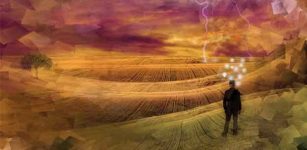Why Are People Fascinated With Zombies? – A Scientist Offers An Explanation
MessageToEagle.com – From the popularity of violent video games to the skyrocketing appeal of the zombie thriller TV show The Walking Dead, it seems like everyone is talking – at least in pop culture circles – about the apocalypse.
The fascination with the end of the world, says Stanford literary scholar Angela Becerra Vidergar, can be traced to the advent of nuclear warfare during World War II.
Our collective visions of the future changed drastically after the horrific events of Hiroshima and Nagasaki, explains Vidergar.
Mass destruction became a reality and the terrible violence of the Holocaust and other WWII events brought up disturbing realizations about the human capacity for violence. We no longer necessarily “imagine the type of positive future that was more prevalent in centuries past, for example, during the Enlightenment or the Industrial Revolution,” said Vidergar. Vidergar explores these themes in her doctoral dissertation, “Fictions of Destruction: Post-1945 Narrative and Disaster in the Collective Imaginary.”
As part of her research, Vidergar, a doctoral candidate in comparative literature, examined mass disaster stories in books, television, advertisements and movies. She found that the events of the 20th century, “along with movements to increase environmental awareness,” have caused a lot of doubt about the consequences of our development as modernized societies, and “instead we are left with this cultural fixation on fictionalizing our own death, very specifically mass-scale destruction.”
According to Vidergar, “We use fictional narratives not only to emotionally cope with the possibility of impending doom, but even more importantly perhaps to work through the ethical and philosophical frameworks that were in many ways left shattered in the wake of WWII.”
Through her dissertation, Vidergar has come to the question of how we generally engage with history in our everyday lives, and how this manifests itself in our culture: “How does it affect our ability to act in the present or our inability to act in some ways, and even more importantly, how we can imagine the future?”

“In a way, survivalism has become a dominant mode of self-reference for a greater number of people,” said Vidergar.
“You see that in the obsession in apocalypse and disaster in the fictional stories we tell. Furthermore, it is not only the survival of ourselves as individuals that we are concerned with, but the survival of entire communities – even humanity as a whole.”
Peace after war
Despite the fact that people resolved to make the world a more peaceful place after they witnessed the atrocities of nuclear war, Vidergar believes most would agree that this has not turned out be the case.
“There have been other atrocities, other genocides and other disasters,” said Vidergar.
“We are still struggling to answer those questions of what it means to be human and not only prepare ourselves for new threats, but also deal with those past horrors and disasters in our present and future.”
The idea that humans could be nearly extinct or extinct has become a lot more prevalent, but Vidergar says disaster narratives do not necessarily portray this as a negative. “It is very frightening, but there is a kind of freedom in thinking about starting anew,” said Vidergar.
“I think that we still want to think that we would be a phoenix rising from the ashes, that we would do things differently – that we would rebuild and make the world a better place.”
The intrigue of survivalism
The drive for survival can be said to be an inherent attribute of mankind. However, in recent decades there has been increased interest in survivalism as a movement of individuals or groups to actively prepare for disaster.
Vidergar has identified a clear increase over the past century in the portrayal of post-apocalyptic worlds in television, movies, books and graphic novels among other media – disaster scenarios brought about by events such as nuclear explosions, pandemics or the proliferation of horrific creatures.
While disaster fiction has existed for centuries, Vidergar points out in her research that it is the nature and scale of destruction that is particular to the cultural milieu since the mid-20th century.
She has found that many of these fictions are clustered around crisis points like the post-WWII decade and the years since the September 11, 2001, terrorist attacks.
“The spikes in our interest in survivalism and disaster around these time nodes suggests these events are catalysts for the formation of a collective imaginary of destruction,” Vidergar said. “That imaginary reveals itself in cultural products like literature, films and video games.”
“Traumatic events,” she added, “trigger discernible shifts in what we are able to imagine our future to be and how we should consequently act in the present to address those threats.
Since the events of the 20th century and beyond, what we imagine doesn’t look so good.”
Hope, despair and the art of survival
While scholars have linked the intrigue of zombies to a manifestation of consumerism, Vidergar says that cultural manifestations of horror, no matter how realistically unbelievable, are a “testament to people’s desire to not only survive, but even possibly improve the world in the face of a seemingly impossible situation.”
During a presentation for colleagues at the Graphic Narrative Project, a Theodore and Frances Geballe Research Workshop at the Stanford Humanities Center, Vidergar discussed the findings of the final chapter of her thesis, which cites The Walking Dead as one of many cultural examples of how apocalyptic fascination helps us process the increased sense that human extinction could become a reality.
A pivotal moment in The Walking Dead cable series is when the protagonist proclaims, “We are the walking dead!” Vidergar believes that this comment really defines what the series and fascination is truly about. Although menacing zombies take center stage in nearly every scene of the fictitious drama, Vidergar asserts that zombies are not actual subject of the series.
“Zombies are important as a reflection of ourselves,” said Vidergar. “The ethical decisions that the survivors have to make under duress and the actions that follow those choices are very unlike anything they would have done in their normal state of life.”
Based on a comic book series, the show, Vidergar said, “allows the audience to work through some of those difficult, threatening ethical dilemmas, or to think about their own capacity for survival. What character would I be like? What would I be willing to do in order to survive?” Although Vidergar’s research has focused on terror, destruction and death, she still sees evidence in her work of optimism about the future.
“There is this glimmer of hope that I am really interested in,” said Vidergar.
“Even if as a society we have lost a lot of our belief in a positive future and instead have more of an idea of a disaster to come, we still think that we are survivors, we still want to believe that we would survive.”
© MessageToEagle.com










